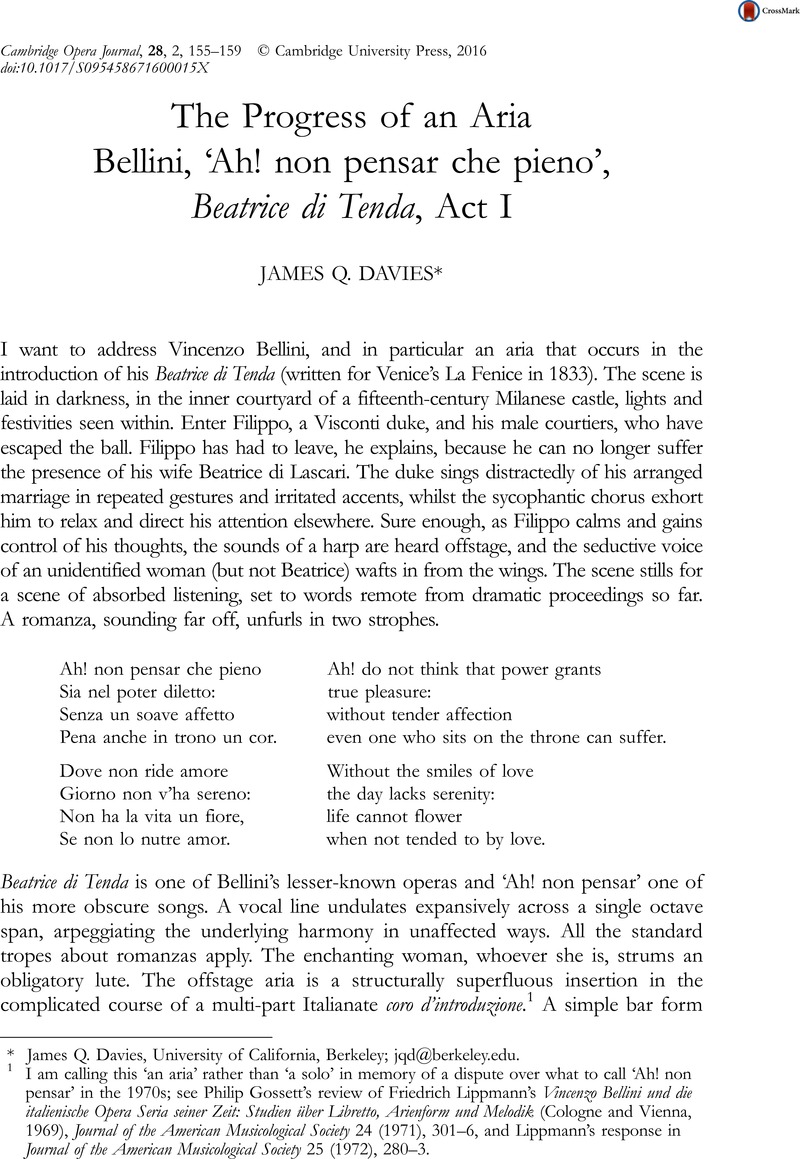No CrossRef data available.
Published online by Cambridge University Press: 28 September 2016

James Q. Davies, University of California, Berkeley; [email protected].
1 I am calling this ‘an aria’ rather than ‘a solo’ in memory of a dispute over what to call ‘Ah! non pensar’ in the 1970s; see Philip Gossett’s review of Friedrich Lippmann’s Vincenzo Bellini und die italienische Opera Seria seiner Zeit: Studien über Libretto, Arienform und Melodik (Cologne and Vienna, 1969), Journal of the American Musicological Society 24 (1971), 301–6, and Lippmann’s response in Journal of the American Musicological Society 25 (1972), 280–3.
2 On these strophic lyric types, see Hepokoski, James, ‘Ottocento Opera as Cultural Drama: Generic Mixtures in Il trovatore ’, in Verdi’s Middle Period (1849–1859): Source Studies, Analysis, and Performance Practice, ed. Martin Chusid (Chicago, 1997), 147–196 Google Scholar.
3 Lippmann, Friedrich, Maguire, Simon and Smart, Mary Ann, ‘Bellini, Vincenzo’, in The New Grove Dictionary of Music and Musicians, ed. Stanley Sadie, 29 vols. (London, 2001), 3: 209 Google Scholar.
4 Philip Gossett made this observation in his ‘Introduction’ to Vincenzo Bellini: Beatrice di Tenda, facsimile edition, 2 vols. (New York, 1980), 1: n.p.
5 Gossett, ‘Introduction’, 1: n.p.
6 One possible though speculative source for ‘Ah! non pensar’ is a free-standing and no longer extant romanza composed while Bellini was in Milan working on La straniera, and listed in the work catalogues of the composer’s earliest biographers under the title ‘Ah! non pensai’.
7 Couzens, Tim, Murder at Morija: Faith, Mystery, and Tragedy on an African Mission (Charlottesville, 2003), 45 Google Scholar.
8 One composer to rival Bellini – who probably grew up singing ‘Bellini’s canticle’ at the Morija Training Institution or ‘Thabang Normal School’ – was the great Basotho composer Joshua Pulumo Mohapeloa (1908–82), whose recent critical edition of choral works was dedicated to Roger Parker and published under the expert editorship of Christine Lucia; see her ‘General Introduction’, Mohapeloa Critical Edition, 6 vols. (Cape Town, 2015), 1: ii–xxvi.